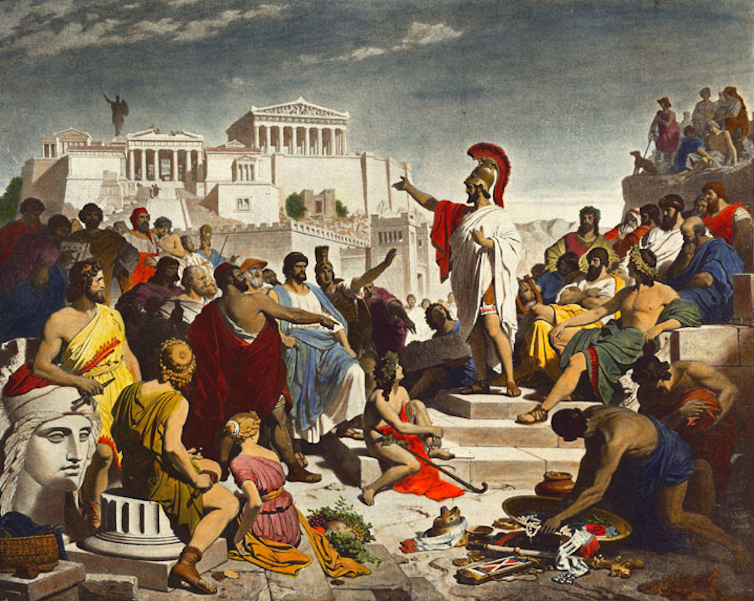Aristotle Said That Extreme Democracies, Pure Oligarchies, or Tyrannies Can Develop From What Cause?

Why tyranny could be the inevitable outcome of republic
Plato, 1 of the primeval thinkers and writers nigh republic, predicted that letting people govern themselves would somewhen lead the masses to support the rule of tyrants.
When I tell my college-level philosophy students that in almost 380 B.C. he asked "does not tyranny spring from democracy," they're sometimes surprised, thinking it's a shocking connectedness.
But looking at the modernistic political world, it seems much less far-fetched to me now. In democratic nations similar Turkey, the U.Yard., Hungary, Brazil and the U.S., anti-elite demagogues are riding a wave of populism fueled by nationalist pride. It is a sign that liberal constraints on republic are weakening.
To philosophers, the term "liberalism" means something different than it does in partisan U.S. politics. Liberalism as a philosophy prioritizes the protection of individual rights, including liberty of thought, faith and lifestyle, against mass opinion and abuses of authorities ability.
What went incorrect in Athens?
In classical Athens, the birthplace of democracy, the autonomous associates was an arena filled with rhetoric unconstrained by any delivery to facts or truth. So far, so familiar.
Aristotle and his students had non yet formalized the basic concepts and principles of logic, and so those who sought influence learned from sophists, teachers of rhetoric who focused on controlling the audience'due south emotions rather than influencing their logical thinking.
In that location lay the trap: Power belonged to anyone who could harness the collective will of the citizens directly by appealing to their emotions rather than using bear witness and facts to change their minds.

Manipulating people with fear
In his "History of the Peloponnesian War," the Greek historian Thucydides provides an instance of how the Athenian statesman Pericles, who was elected democratically and not considered a tyrant, was however able to dispense the Athenian citizenry:
"Whenever he sensed that arrogance was making them more than confident than the situation merited, he would say something to strike fear into their hearts; and when on the other paw he saw them fearful without good reason, he restored their confidence again. So it came most that what was in name a democracy was in practice government by the foremost man."
Misleading spoken communication is the essential element of despots, because despots need the support of the people. Demagogues' manipulation of the Athenian people left a legacy of instability, bloodshed and genocidal warfare, described in Thucydides' history.
That record is why Socrates – before beingness sentenced to decease by democratic vote – chastised the Athenian democracy for its elevation of pop opinion at the expense of truth. Greece's bloody history is also why Plato associated republic with tyranny in Book Viii of "The Republic." It was a republic without constraint against the worst impulses of the majority.
Pembaca kami
Jumlah pembaca The Chat sebanyak 18 juta pengguna setiap bulan, dan melalui Artistic Commons republikasi menjangkau 42 juta pembaca.
Mau menulis?
Tulis artikel dan bergabung dengan komunitas akademisi dan peneliti yang terus tumbuh dengan lebih dari 141.300 dari iv.283 lembaga.
Daftar sekarang
Source: https://theconversation.com/why-tyranny-could-be-the-inevitable-outcome-of-democracy-126158

0 Response to "Aristotle Said That Extreme Democracies, Pure Oligarchies, or Tyrannies Can Develop From What Cause?"
Post a Comment